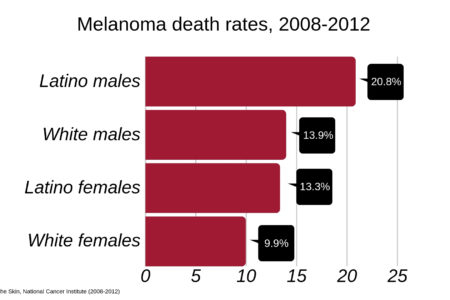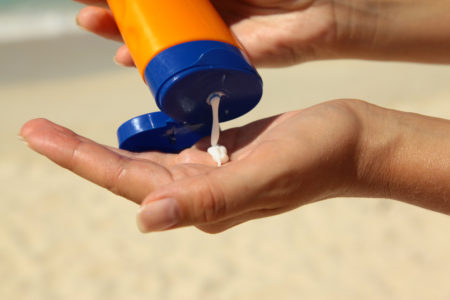
Share On Social!
UPDATE: The FDA extends comment period until June 27, 2019!
Chemicals found in reportedly 65% of over-the-counter sunscreens could be causing significant health and environmental concerns.
Oxybenzone, one of the chemicals in sunscreen, allegedly caused the death of coral reefs and harmed human skin and hormones, according to the Environmental Working Group (EGW).
Doctors have OK’d the use of sunscreen to protect against skin cancer, which is rising among Latinos, but debate rages over the consequences of oxybenzone exposure.
The FDA wants your opinion on its proposed a new rule in the Federal Register that could ban the use of harmful additives in sunscreen by June 27, 2019!
How to Submit a Comment for Safe Sunscreen!
- Copy the Salud America! model comment below (and add a personal story)
I must be able to trust sunscreen products available on the market. In the past 20 years, melanoma (skin cancer) incidence has risen by 20% in the Latino community, reinforcing the need for safe means of Ultraviolet protection. If over-the-counter sunscreens contain chemicals, specifically oxybenzone, avobenzone, octisalate, octocrylene, homosalate, and octinoxate, that harm our bodies or the environment, the FDA must prohibit the use of those substances. Exposure to these chemicals can have long-term negative impacts on consumers’ skin and hormones, according to the Environmental Working Group. Also, coral reefs have reportedly died due to the ingredients found in some sunscreens. States, such as Florida and Hawaii, are taking measures to ensure the public’s and the environment’s safety. I urge the FDA to continue conducting research on questionable chemicals found in some sunscreens and do all that is necessary to implement new regulations that will keep us and our planet safe.
- Go to regulations.gov and paste this comment in the “Comment” box.
- Add your info. Click “Continue.”
Check the box at the bottom. Click “Submit Comment.”
Potential Sunscreen Risks
Chemicals used in UV protectors, also found in cosmetics, have been linked to disrupting hormone function. Higher oxybenzone levels in adolescent males can lead to a decrease in their testosterone levels by a significant margin, according to a study published in Environmental Health Perspectives.
 Usage of chemical-based sunscreens could also cause allergens and breakouts where the products are applied. A study conducted by the National Institute of Dermatology of Colombia showed that 31% of test subjects had some allergic reaction due to oxybenzone exposure.
Usage of chemical-based sunscreens could also cause allergens and breakouts where the products are applied. A study conducted by the National Institute of Dermatology of Colombia showed that 31% of test subjects had some allergic reaction due to oxybenzone exposure.
While there is no definitive body of research in these issues, there is enough evidence for the FDA to reconsider its current stance on chemical-based sunscreens.
This is important for Latinos.
Latinos face the risk of skin cancer. This population should take measures, such as sunscreen use, to prevent melanoma incidence. Diagnoses of melanoma have risen by 20% in the Latino community over the past 20 years.
Chemical Damage to Coral Reefs
In the past year, two states have taken major steps to reduce coral reef losses caused by chemical exposure.
This destructive process, or coral reef bleaching, happens when swimmers’ sunscreen washes off as they enter the water. The chemicals then harm the reef and its ecosystem, according to a 2008 study.
Earlier this week, Florida (25.6% Latino) Sen. Linda Stewart introduced state-wide legislation that would ban the use of oxybenzone-based sunscreens without a prescription. It aims to protect the U.S.’s largest continental coral reef, the Great Florida Reef.
This bill follows in-step with regulations implemented in Hawaii (10.5% Latino) last summer.
Safe Sunscreens Available
 Doctors make one thing clear – do not stop using sunscreen: The benefits of its Ultraviolet (UV) protection far outweigh the risk of skin cancer.
Doctors make one thing clear – do not stop using sunscreen: The benefits of its Ultraviolet (UV) protection far outweigh the risk of skin cancer.
Mineral-based sunscreens can serve as a chemical-free alternative.
As the FDA is reviewing all the information necessary to make a ruling on the use of these chemicals, EWG recommends mineral-based sunscreens available for purchase. These products provide protection from UV radiation while not containing the additives found in chemical-based protectors.
David Andrews, senior scientist at EWG, said his organization has been working for years to raise awareness about this issue.
“After more than 40 years, the FDA is at last taking serious steps to finalize rules that would require sunscreen companies to make products that are both safe and effective,” Andrews said.
We will be monitoring comment submissions and report the results.
Remember, submit a comment for safe sunscreen by June 27, 2019!
Editor’s Note: This article is part of a collaboration between Salud America! and the Hoffman Toxicant-Induced Loss of Tolerance (TILT) program at UT Health- San Antonio. To find out if you are TILTed due to exposure to everyday foods, chemicals, or drugs, take a self-assessment or learn more about TILT.
Explore More:
Chemical & Toxic ExposureBy The Numbers
1
Quick Survey
Can help you find out how chemically sensitive you are



